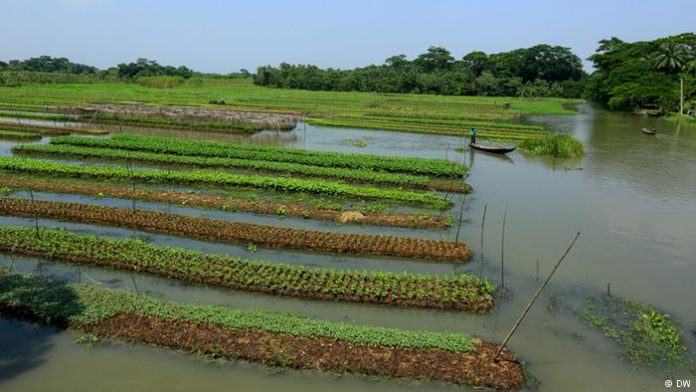Dhaka, March 15, 2019 (BSS) – Despite random use of pesticides in the
country’s conventional agriculture to protect crops from invasion of pests
emerged due to the changes in climate variables, pest and disease
infestations are minimal in the floating gardens set up in coastal districts,
says a new report.
According to data of Bangladesh government, about 37,258 tonnes of
pesticides were used in the country’s agriculture sector in 2017.
The report of Food and Agriculture Organization (FAO) titled ‘The State of
World’s Biodiversity for Food and Agriculture’ released recently revealed the
specific agro-ecological conditions of the wetlands of the Bangladesh’s south
central coastal districts have led to the development of a very particular
production system known as floating gardens, or locally as dhap.
The system involves growing a wide range of crops – vegetables and spices –
on beds made of water hyacinths and other aquatic weeds such as tapapana,
dulalilata and khudipana, which are widely available in the locality.
Crop seeds are prepared separately in containers using a structure called
a tema, which is made of locally available peat soil and wrapped in coconut
coir. Grown seedlings are subsequently transplanted in the floating garden
beds.
The major vegetable crops grown in summer are okra, ribbed gourd, Indian
spinach, brinjal, cucumber, red amaranths, stem amaranths and wax gourd in
the floating gardens. In winter, the main crops are turnip, cabbage,
cauliflower, tomato and red amaranths. Spices which are mainly grown in the
floating garden include turmeric and chili.
“Mixed intercropping is the predominant form of production in floating
gardens. As decomposed water hyacinths are used as fertiliser, external-input
requirements and production costs are low,” the report said.
Under flooded conditions, the open water is used for fishing. This
production system is the only food production and livelihood option for 60 to
90 percent people of the local communities, providing them with a diversified
and nutritious diet thanks to the wide range of vegetables and spices it
produces, according to the FAO report.
Noting that given the very specific and difficult growing conditions,
production yields are satisfactory in the floating gardens, the report
recommended for further improving the production system, strengthening the
social organisation and distribution of activities at local level, improving
product marketing, developing scientifically-recommended crop-production
packages and agro-processing activities.



